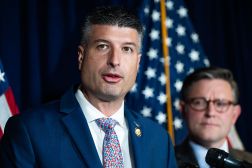Senate staffer: Lawmakers still skeptical of DIUx

Despite the Defense Innovation Unit Experimental’s recent overhaul to add a new director and new authorities, Congress still has its doubts about the Pentagon startup’s effectiveness, one Senate staffer said Tuesday.
Anish Goel, a professional staff member for the Senate Armed Services Committee, said during a panel discussion Tuesday that Congress is still not convinced that DIUx is going to solve the DOD’s problems acquiring innovative technologies.
“The original concept of DIUx was to find companies who were doing sort of groundbreaking technology and marry them up with other organizations in the DOD who need that sort of technology,” Goel said. “But from our perspective the problem before was not that these companies didn’t know what the needs were in DOD; it’s that they didn’t want to work with them because of all of the rules that go along with working with DOD.”
Goel outlined several common problems working with the Defense Department, like the time it takes, the strings attached and the rules companies have to follow.
“So unless you fix all that other stuff in terms of acquisition and contracting…How is DIUx really contributing to that problem?” Goel said. “Having a dating service really is not the problem in our mind.”
Driving innovation through leveraging government laboratories
Goel noted that many of the problems in acquisition “are the fault of Congress over the last 30 years,” but legislators are working to address some acquisition reform in the National Defense Authorization Act for fiscal year 2017 currently working its way through Congress, he said.
In particular, Goel highlighted a pilot program the NDAA create “to demonstrate methods for the more effective development of research, development, test and evaluation functions.”
Laboratory directors selected for the pilot would have the authority to waive any DOD regulations or rules that would hinder that mission.
The theory, Goel said, is that government can foster innovation by letting laboratory leaders hire who they want and work with whom they want, and give them more flexibility in general.
Goel touted the work being done in government labs, but knocked DIUx’s hyper-focus on Silicon Valley.
“The secretary of defense is very fond of going out into the region and saying ‘this is where we’re going to find innovation, this is where we’re going to find new technologies,’ ignoring the fact that to get to San Francisco he flew over all the labs… and ignored all the great work that’s being done sort of in the defense research enterprise,” Goel said.
He noted: “It leaves us thinking: does the secretary of defense actually know what’s going on inside the Department of Defense in terms of research and innovation?”
DIUx has been chastised before for focusing too much on Silicon Valley, and the program has since added hubs in Boston and Austin, Texas.
[Read more: DIUx expands to Austin, Texas]
When he asked why government wasn’t doing more to leverage the work going on in national laboratories, fellow panelist Melissa Flagg, deputy assistant secretary of defense for research, said, “we are, we are.”
Goel mentioned the recent upgrades to DIUx, noting the new contracting authorities DIUx is now using.
“Our thinking is, well why can’t all these other programs be free of those regulations too?” Goel said. “Why is it only DIUx that gets to have special authorities and gets to have these special acquisition [authorities]… Why can’t we just extend that to all of the Department of Defense?”
Raj Shah, director of Defense Innovation Unit Experimental, noted in a panel discussion Wednesday at the AUSA 2016 conference that contrary to Goel’s statements, the commercial solutions opening authorities DIUx is using to speed up acquisition are not uniquely granted to the program but to the whole department.
Goel also said Congress is still wondering how DIUx is any different from other programs designed to drive innovation in agencies, and specifically for the DOD.
All of the questions about DIUx, Goel said, “have heretofore remained unanswered.”
Could In-Q-Tel’s model be applied in other agencies?
The Tuesday panel hosted by SRI International also addressed the possibility of developing an In-Q-Tel-like program in other agencies.
Flagg noted the Defense Department has tried to set up organizations like it for their work, and “they’ve always been deemed illegal eventually, and we’ve been told that we have to shut them down.”
“We’ve just had a more stringent oversight at DOD than perhaps the intelligence community enjoys,” Flagg quipped.
Goel said he thinks an In-Q-Tel-like program “would be beneficial for the Department of Defense.”
But as for DOD using In-Q-Tel directly, Goel was skeptical.
“I don’t know that In-Q-Tel is the most appropriate company for the Department of Defense. So an In-Q-Tel-like firm, I think, sounds great, but up on the Hill we’ve gotten very little explanation for why In-Q-Tel for Department of Defense,” Goel said.
He added that “the little explanation that we’ve gotten is that, ‘well yeah the CIA uses it so we’re going to use it too.’ And that makes me a little skeptical.”
Panelist Eric Chen, founder and early-stage investor for Uj Ventures, said he thought In-Q-Tel has been successful thus far.
“In-Q-Tel has been pretty successful I think, from the people I’ve talk to who used to work there, the venture investors who used to run In-Q-Tel, in at least seeing what’s out there and seeing the right companies that are strategic for their mission,” he said.






